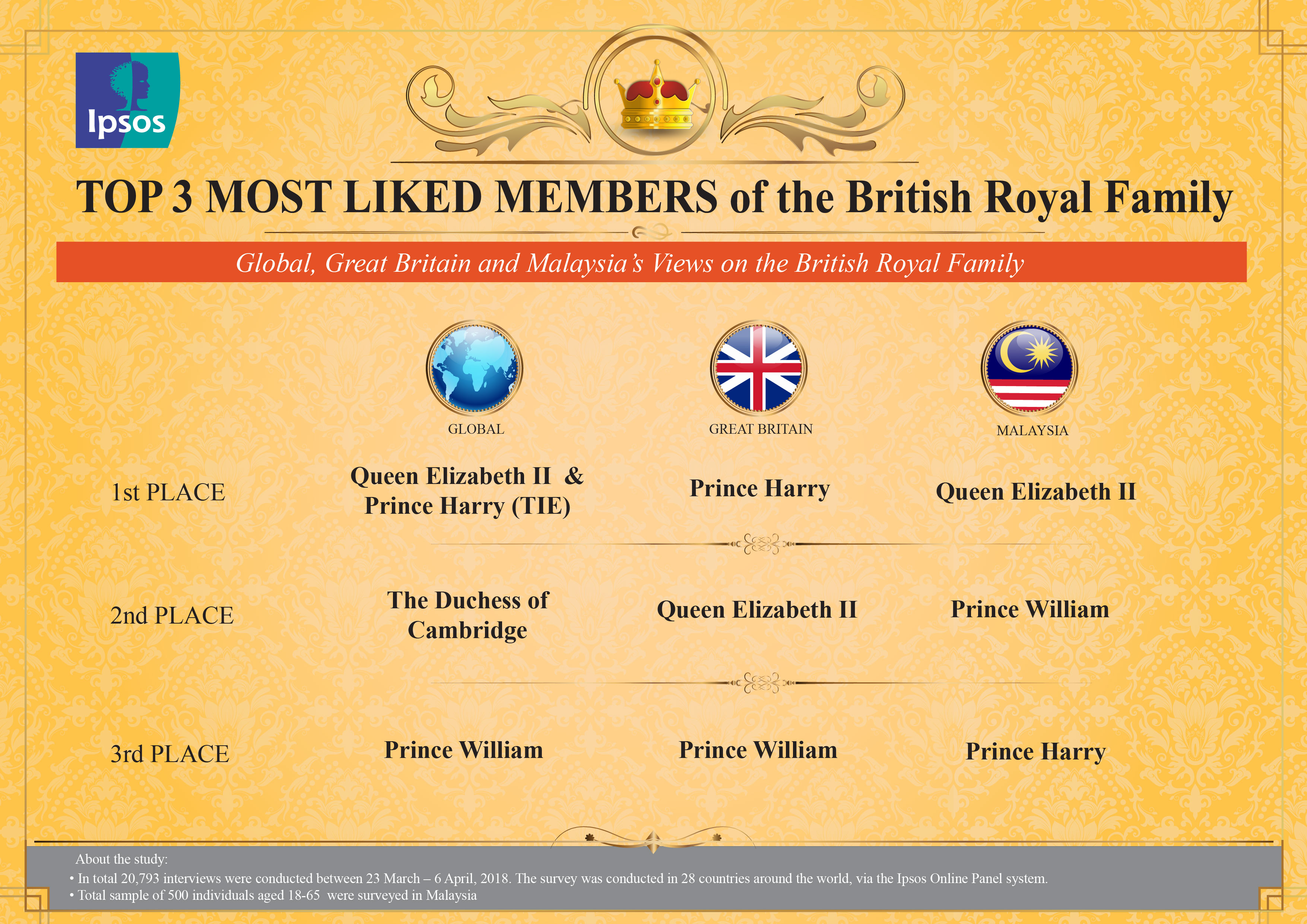Malaysians' Views on The British Royal Family
Ipsos study reveals Malaysians' views on the British Royal Family
- Top 3 most liked Royals by Malaysians and Britons are The Queen, Prince William and Prince Harry.
- Prince Charles is more liked by Malaysians than British Citizens, making it the 3rd country with the highest score for Prince Charles after Romania and India.
- Malaysians believe that the Royal Family reinforces perceptions of the United Kingdom as a traditional and powerful country.
Which members of the Royal Family are liked the most?
A new global Ipsos survey, carried out in 28 countries examined the feelings towards the Royal Family and individual members of it. The survey, carried out online showed that Malaysians' Top 3 most liked Royals are The Queen (32%), Prince William (25%) and Prince Harry (23%). The Britons shared the same favourites as Malaysians, with a slightly different order where Prince Harry (42%) was most liked, followed by The Queen (32%) and Prince William (30%). While the top 3 most liked members of the Royal Family overall around the world are The Queen and Prince Harry (tied at 23% each), the Duchess of Cambridge (18%) and Prince William (17%).
Malaysians' views towards the Royal Family are more favourable (35%), higher than in Great Britain (33%) and overall around the world (24%). Prince Charles is liked by Malaysians (15%) more than the Britons (9%) and even the rest of the world (8%).
Meghan Markle, who just tied the knot with Prince Harry, is also starting from a positive base, albeit with the lowest profile of all. She was placed as the 6th most liked member overall around the world, ahead of 9 other family members.

What impact does the Royal Family have on UK's image?
The Royal Family does tend to reinforce perceptions of the UK as a traditional and powerful country. When Malaysians were asked to pick from a list of attributes they associate with the UK because of the Royal Family, "traditional" (34%) was picked most, followed by "powerful" (33%). This was unanimously agreed across the world with "traditional" (48%) and "powerful" (22%) as top picks. 15% say the Royal Family makes them think the UK is "an unequal society" - particularly in countries with more negative attitude to UK such as Argentina, Chile and Turkey.
Commenting on the findings, Jane Lattimore, Director of Ipsos Marketing in Malaysia said:
"Being British, and having grown up in Britain, I have seen first-hand the mixed feelings that Britons have about the Royal Family, in particular they have struggled to make themselves relevant. Recently, we've seen the Royals making a comeback, which we see reflected in this study, they are showing their resilience, and are working to keep themselves relevant. Their international reputation is particularly bolstered not only by the popularity of The Queen, but also the younger generation, which gives the Royal Family a solid foundation for the future. This data also shows just how important the younger royals, in particular Prince William and Harry, are in driving the relevance of this monarchy.
Newer members of the family are also contributing to the growing relevance, and liking of the Royal Family - The Duchess of Cambridge is just as well liked as her husband, and even though Meghan Markle's profile is lower for the moment, we know that this will change, and she is already starting from a very positive position."
Note to editors:
- In total, 20,793 interviews were conducted between 23 March - 6 April 2018.
- The survey was conducted in 28 countries in the world, via the Ipsos Online Panel system in Argentina, Australia, Belgium, Brazil, Canada, China, France, Germany, Hungary, India, Italy, Japan, Malaysia, Mexico, Peru, Poland, Romania, Russia, Saudi Araba, Serbia, South Africa, South Korea, Spain, Sweden, Turkey, Great Britain and the USA.
- Approximately 1000 individuals aged 18-65 were surveyed in Australia, Brazil, Canaa, China, France, Italy, Japan, Romania, Russia, Spain, Great Britain, and the USA. Approximately 500 individuals aged 18-65 were surveyed in Argentina, Belgium, chile, Hungary, India, Malaysia, Mexico, Peru, Poland, Saudi Arabia, Serbia, South Africa, South Korea, Sweden, Turkey.
- Where results do not sum to 100 or the 'difference' appears to be 1 more/less than the actual, this may be due to rounding, multiple responses, or the exclusion of don't knows or non stated responses.
- The data are weighted to match the profile of the population. 17 of the 28 countries surveyed generate nationally representative samples in their countries (Argentina, Australia, Belgium, Canada, France, Germany, Great Britain, Hungary, Italy, Japan, Poland, Romania, Serbia, south Korea, Spain, Sweden and United States). Brazil, Chile, China, India, Malaysia, Mexico, Peru, Russia, Saudi Arabia, South Africa and Turkey produce a national sample that is considered to represent a more affluent, connected population. These are still a vital social group to understand in these countries, representing an important and emerging middle class.
- The precision of Ipsos online polls are calculated using a credibility interval with a poll of 1,000 accurate to +/- 3.5 percentage points and of 500 accurate to +/- 5.0 percentage points. For more information on the Ipsos use of credibility intervals, please visit the Ipsos website.



